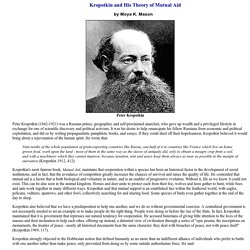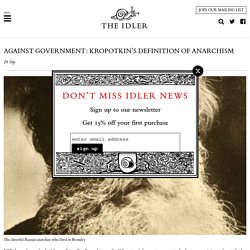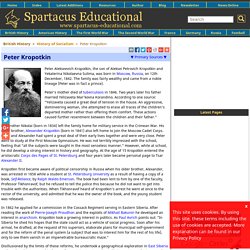

Mutual aid quote. Kropotkin and His Theory of Mutual Aid - cooperation, Huxley, Darwin, cooperative communities, guilds, Hobbes. Peter Kropotkin Peter Kropotkin (1842-1921) was a Russian prince, geographer, and self-proclaimed anarchist, who gave up wealth and a privileged lifestyle in exchange for one of scientific discovery and political activism.

It was his desire to help emancipate his fellow Russians from economic and political exploitation, and did so by writing propagandistic pamphlets, books, and essays. If they could shed off their hopelessness, Kropotkin believed it would bring about a rejuvenation of the human spirit. He wrote that: Nine-tenths of the whole population of grain-exporting countries like Russia, one-half of it in countries like France which live on home grown food, work upon the land - most of them in the same way as the slaves of antiquity did, only to obtain a meagre crop from a soil, and with a machinery which they cannot improve, because taxation, rent and usury keep them always as near as possible to the margin of starvation (Kropotkin 1912, 412).
The naturalist, Thomas H. Bibliography. Against government: Kropotkin’s definition of anarchism. FOR those of you who don’t know, Prince Petr Kropotkin was the 19th century’s foremost proponent of voluntary association and mutual aid – often known as anarchism – as a political principle.

He wrote that under anarchism we’d be free from state and corporate control: “man would not be limited in the free exercise of his powers in productive work by a capitalist monopoly, maintained by the state; nor would he be limited in the exercise of his will by a fear of punishment, or by obedience towards individuals or metaphysical entities, which both lead to depression of initiative and servility of mind.” Kropotkin lived for a while in a small terraced house in Bromley, Kent, which stands to this day, and has been honoured with a blue plaque.
He influenced Oscar Wilde’s political thought and was described by Wilde as “that great white Christ coming over from Russia”. We reproduce it here in full. The historical development of anarchism As has been pointed out by Prof. Prof. ‘Anarchism could help to save the world’ Ed Miliband’s late-night pilgrimage to Russell Brand’s loft apartment, days before the last election, was seen by supporters as a canny bid for the youth vote, and by critics as a cringe-worthy attempt to harness the Shoreditch Messiah’s charisma.

Yet neither view captures its real significance as a sign of the profound weakness of mainstream social democracy and its desperate efforts to co-opt the energies of the most dynamic element of today’s left: anarchism. In their eagerness to ridicule Brand’s “ramblings”, commentators have ignored his strong identification with the left-anarchist tradition. For among the works he has recommended to his followers is a collection of writings by another charismatic figure who sometimes lived in London, the father of anarchist communism: Prince Peter Kropotkin. Comparisons between Kropotkin and Brand may seem strained. It is no surprise that anarchist sages and prophets should be so fashionable, both then and now.
Peter Kropotkin. Peter Alekseevich Kropotkin, the son of Aleksei Petrovich Kropotkin and Yekaterina Nikolaevna Sulima, was born in Moscow, Russia, on 12th December, 1842.

The family was fairly wealthy and came from a noble lineage (Peter was in fact a prince). Peter's mother died of tuberculosis in 1846. Two years later his father married Yelizaveta Mar'kovna Korandino. According to one source: "Yelizaveta caused a great deal of tension in the house. An aggressive, domineering woman, she attempted to erase all traces of the children's departed mother rather than offering them comfort. His brother Nikolai (born in 1834) left the family home for military service in the Crimean War. Kropotkin first became aware of political censorship in Russia when his older brother, Alexander, was arrested in 1858 while a student at St. In 1862 he applied for a commission in the Cossack Regiment serving in Eastern Siberia.
In March 1874 he was arrested by the police. Kropotkin published An Appeal to the Young in 1880. Anarchist Peter Kropotkin championed by Tom Hodgkinson.